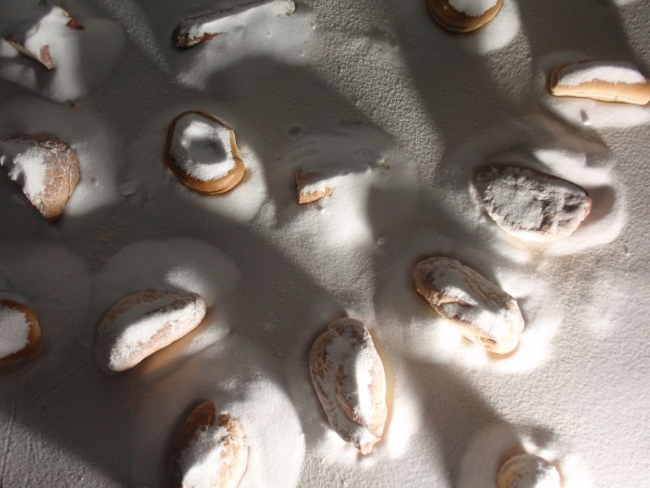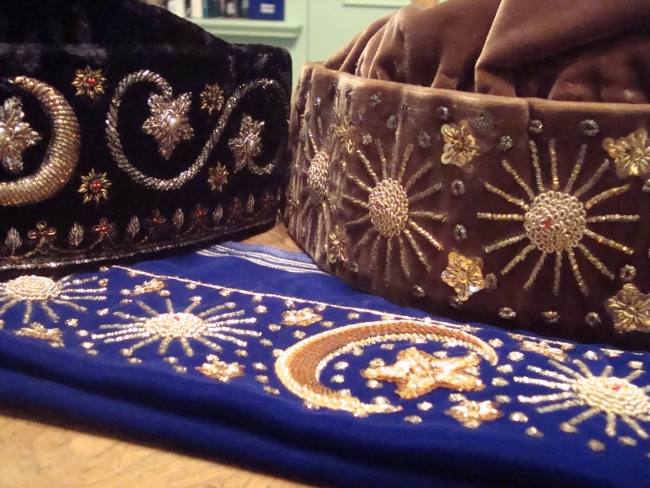Shakeela Hassan
by Winnifred Sullivan

In December 2010 Dr. Shakeela Hassan, retired University of Chicago anesthesiologist, attended a Lunch Event of the Inner-City Muslim Action Network (IMAN) at the Hyatt Regency-McCormick Place in Chicago, one of many such events she attends as a leading Chicago philanthropist. She picked up her table number. Number 22. Not number 1, she thought, and not number 165. Somewhere in the middle. She liked that. When she found her table it was right in front of the speaker’s podium. Three women were already seated at the table. They motioned to her to join them. Then Keith Ellison, the first U.S. congressman to identify as a Muslim, Democrat of Minnesota, joined the table. Ellison and Hassan had not previously met. As they talked, men and women came up to Hassan greeting her and hugging her. Finally, Ellison said, “You seem to know everyone.” “Yes,” she said, “they are my faith and my family.”
“They” are the wider community of the Nation of Islam, some still members, some not. “They” are those who welcomed and nurtured Hassan when she came to the U.S. from Pakistan as a young doctor in the late 1950s. Dr. Hassan came to take up an internship at Northwestern University Hospital, eventually choosing to specialize in anesthesiology, and then to a teaching appointment at the University of Chicago Hospitals. As a young woman in her early twenties, new to Chicago, and not entirely comfortable with American student life, her husband-to-be Zia Hassan introduced her to Elijah Muhammad, as well as to Muhammad’s wife, Sister Clara, and their eight children.
As she sees it now, looking back half a century, as she began her professional career she also launched her spiritual path. Dr. Hassan’s life as a Muslim in the United States displays unexpected conjunctions challenging us to enlarge our assumptions about the Nation of Islam, its forms of spirituality, and the ways its practices of food and dress produce and cultivate forms of piety across cultures, continents and generations. Now working with Bill Kurtis to produce a film about sounds in the three Abrahamic traditions, Dr. Hassan traces the beginnings of her interfaith sensibility to the generosity and hospitality of “them”—Elijah and Clara Muhammad, her first U.S. family in faith (as well as the nuns who welcomed her at St. Mary of Nazareth hospital in Chicago where she also worked as a young resident physician.)
Zia Hassan, Hassan’s husband, had met Elijah Muhammad through his older brother, who had preceded him to the U.S. Zia’s brother, a thoracic surgeon, had himself met Elijah Muhammad when he treated him as a patient, and had been invited to his home. At that time, Zia’s brothers-in-law were the Pakistani publishers of the most widely sold English translation of the Qu’ran. When Zia Hassan’s brother mentioned to Elijah Muhammad that his younger brother would be coming to the U.S. to study, the leader of the Nation insisted on having them met at the airport in New York City. The young man Elijah Muhammad sent to greet Zia Hassan and his brother that day was none other than Malcolm X.
Shakeela Hassan remembers many evenings sitting at the dining room table in Elijah Muhammad’s house. Sometime in the late 1950s he said that he wanted a special hat for a special occasion: a fez. As they sat talking, she drew a hat on a piece of paper, combining a Pakistani style with what she proposed as symbols of the Nation of Islam, namely a Crescent and Star woven into the design motif. She bought fine velvet fabric at Marshall Field’s department store, fabric which she sent back to Lahore with friends who arranged for the embroidery to be applied to her specification. It was the first of many she would have made in different colors:
When she speaks of Elijah Muhammad and Sister Clara today, now some fifty years later, Dr. Hassan speaks warmly of their hospitality—of how food was brought to her house when each of her children were born—of how she learned to make a soup that she still makes in quantity to share with friends and family—of how Sister Clara arranged for clothes to be made for her at the Nation’s clothes factory, jackets and long skirts that Sister Clara thought suitable and dignified for Shakeela Hassan to wear as a woman doctor in a hospital. Some of the clothes that were designed for the women of the Nation were, in turn, modeled on the shalwar kameez that Shakeela had worn when Sister Clara first met her. The long tunic tops and “baggy pants” of her home country now became the inspiration for the distinctive dress of the women of a new American religious movement.
Zia and Shakeela Hassan were first-hand witnesses to Elijah Muhammad’s role in shaping the destiny and determination of Cassius Clay to become the world’s best and foremost boxing legend as a convert to Islam. Shakeela recalls how lovingly and gracefully Sister Clara would attend to details of table etiquette to taking turns in table conversations with the dynamic young guest, Ali, at the family dinners, where the Hassans were frequently present.
Asked about what it was like to know Malcolm X, Dr. Hassan responds:
I . . . met Malcolm and his wife Betty, in the late 1960s. She was a nurse. I’ll never forget what great pride Elijah Muhammad took in introducing us to one another because we were both healthcare professionals! There was such a simple elegance in just being able to share our experiences working to care for the sick. But more than that, this immigrant new kid on the block found the greatest of human comforts in the home of Elijah Muhammad: home cooked meals, love of elders and children, a strong family presence, and someone to look up to. At the time, the Muslim identity of our (Zia’s and mine) new ‘family’ was not as important as it became later in our relationship—later as my own identity as an American Muslim began to develop. What I will always cherish from that time is the vivid memory of a family who devoted themselves to giving their community a deep sense of self-respect, rooted in a commitment to self-improvement and self-empowerment—against tremendous odds and in the midst of horrible discrimination and prejudice. To take charge and be themselves was an awesome lesson in grass root participation—a vision of immense humanity and community.
She continues:
I can remember being invited for the first time to the home of Elijah Muhammad and his wife Sister Clara Muhammad. Zia and I were always welcomed with open arms. Not only were we invited to be at table with the family, but Elijah Muhammad treated us like family. Not unlike my own dear father, he entertained any and all questions from a young Pakistani woman doctor whose curiosity never allowed her to remain silent. As for Sister Clara, she was nothing short of a mother to me. Whatever she did, she always understood herself to be setting an example for others—from the way she meticulously arranged the contents of her purse and attended to the minutest details of keeping a clean home ‘where the angels would feel welcome,’ to the loving way in which she prepared meals for her family and guests. As dignified a woman as she was, however, she was never stiff or aloof. My fondest memories are her teaching me how to make her famous navy bean soup—something I make to this day for her grandchildren who are like children to me.
Sister Clara Muhammad’s Bean Soup
2 pound bag small navy beans
1 pound bag lentils
1 large onion—chopped
1 sweet green pepper—chopped
1 bunch celery—chopped
1 small can tomato paste
1 cup oil
1 tsp sugar
1 tsp rubbed sage
1 tsp black pepper
1 tsp paprika
salt to tasteSoak beans and lentils well covered with water over night. Rinse and cover with fresh water together with all other ingredients. Boil and then simmer till beans are tender. Serve whole or pureed in a food processor to a course or smooth grind. The prepared soup can be saved frozen in plastic containers. To serve add boiling water to achieve desired consistency.
Shakeela Hassan’s recipe remarks:
Sister Clara’s favorite was the smooth grind. She introduced me to the food processor of its time—the Foley Food Mill. I still have that hand-held machine that gave me the pleasure to know I could follow Sister Clara’s recipe with perfection. Pleasure and pride and my purpose was to feel good about healthy eating and inclusion of whole grains, proteins and food values in terms of vitamins, minerals thru the use of lentils, fresh vegetables and preparing it with patience and love to make that taste worth its weight in grains and gratitude. Croutons and extra sharp cheddar cheese cubes and Tabasco hot sauce are the memorable ingredients from Sister Clara’s times. Sister Clara served her soup with home made whole wheat bread—sliced and slow oven-toasted accompaniment with a smile—her smile was meaningful to convey—the message of good eating for health and human reasons to share with love, generosity and gratitude. To this date I make about twice a year a very large amount to share with my family and have it in the freezer ready for serving ourselves or to visiting family and friends! Thank you Sister Clara—some day I hope to write the Bean Soup Legacy and a poem in sharing the memories and moments of learning lessons in life, love and sharing any and everything!
Since her retirement, Dr. Shakeela Hassan has worked to foster greater understanding among Jews, Christians, and Muslims—seeing this work both as an extension of her healing work as a physician and as honoring the hospitality shown to her as a young immigrant woman by Elijah Muhammad and Sister Clara and to honor the grassroots movement of its kind in achieving social justice and civic responsibility.
